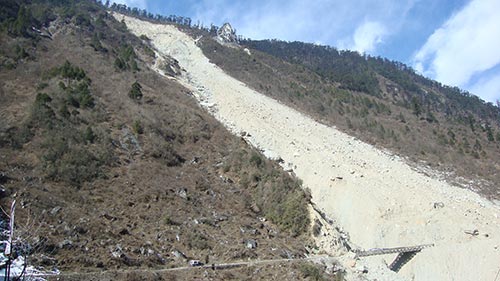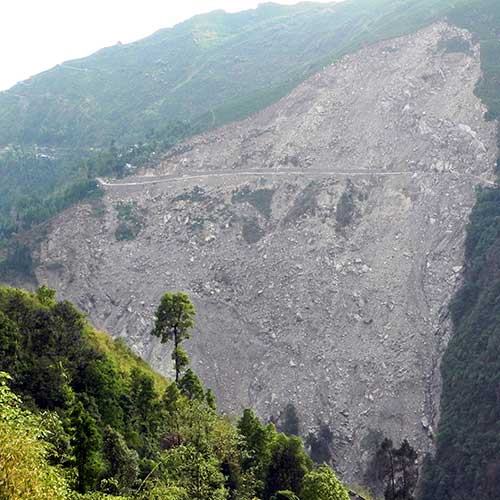LANDSLIP project challenges
LANDSLIP overall aim

LANDSLIP aims to contribute to better landslide multi-hazard risk assessment, early landslide warning and working with national and district authorities for better preparedness, for hydrologically controlled landslides and related hazards, on a regional to catchment spatial scale and a seasonal to daily temporal scale in India.
The main NERC/DFID SHEAR LANDSLIP project research objectives:
- To enhance landslide-related hazard assessment in India at regional scales (e.g. >5 km2) in two main case-study regions, Nilgiris District and Darjeeling/East Sikkim Districts, focusing on weather patterns, landscape systems, rainfall thresholds and societal factors.
- To explore the replicability of methodologies developed in the two case-study regions for other landslide-prone regions such as Uttarakhand.
- To strengthen the understanding of the processes that contribute to hydrologically triggered landslides in the case study regions and how this understanding contributes to landslide warning systems.
- To investigate the various techniques and methods that are used to disseminate landslide early warning information and work with key national, state and district Indian government partners to identify the best techniques and tools to use.
- To disseminate LANDSLIP project knowledge to the broader South Asia region (particularly India and Afghanistan), along with capacity building to ensure LANDSLIP's lasting legacy at Indian national government levels.
Cross-cutting objectives

LANDSLIP has broader cross-cutting objectives in addition to objectives and research questions above.
- Identification of strengths and weaknesses in integrated physical and social science knowledge chains that occur in two landslide-vulnerable regions of India, with the aim of ultimately reducing risks, thus promoting economic development/welfare in the regions.
- Linking natural and social sciences in a multidisciplinary approach that includes participatory stakeholder perspectives for co-produced research. This brings empirical and conceptual contributions across the sciences in India and LANDSLIP into dialogue with stakeholder needs and viewpoints.
- Development of methodologies and intellectual output that are not only of benefit to India, but also contribute to UK-relevant understanding and, through our existing consortium's representations, communicate that understanding to international organisations such as Integrated Research on Disaster Risk (IRDR).
- Promoting the training of UK, Italian and Indian early researchers, through taking on young staff members and hiring staff, but also via over 20 research visitors (1–3 months each) of Indian early/senior researchers at UK/Italian partner institutions.
- Sharing knowledge and information through dissemination with other SHEAR-funded projects through mechanisms of integration that we have built into the funding.
